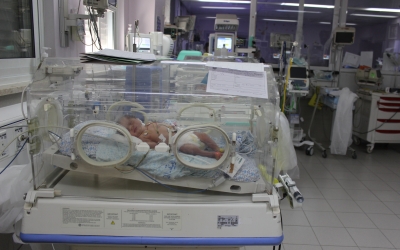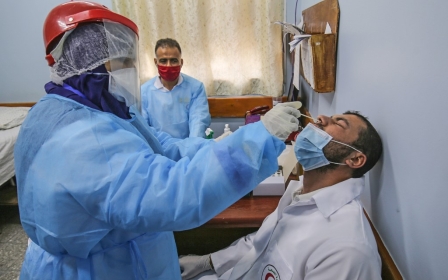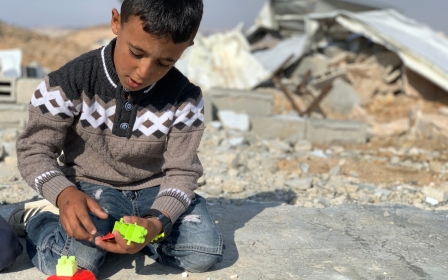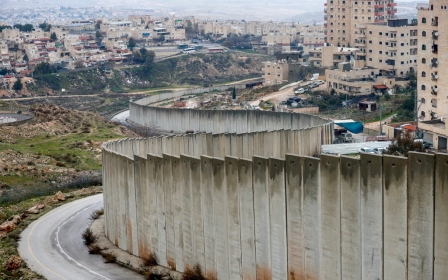Jerusalem's main Palestinian hospital shuts its doors as union strikes
Jerusalem’s largest Palestinian hospital, al-Makassed - the main healthcare institution for many Palestinians - has closed its doors to new patients as employees entered their second day of strike on Tuesday in protest against a financial crisis that has plagued the medical centre for months.
The union for the hospital’s workers said in a statement that staff were unable to carry out their duties due to “the continuing financial crisis and not receiving our dues...and the disregard and recklessness of al-Makassed's administration that we have endured”.
New MEE newsletter: Jerusalem Dispatch
Sign up to get the latest insights and analysis on Israel-Palestine, alongside Turkey Unpacked and other MEE newsletters
The union accused the hospital administration and the Palestinian Authority (PA) of shirking their responsibilities, adding that the hospital and its clinics would no longer receive non-critical patients, but would commit to treating those who had already been admitted before the strike.
Mohammed Ghobash, secretary of the Al-Makassed workers' union, told Middle East Eye that some 850 employees had not received their salaries since October, leaving some of them unable to provide for their families, while others cannot even afford the fare to come to work.
Ghobash added that the hospital has also been suffering from a shortage of medicine and medical supplies.
Known as the “hospital of the poor”, al-Makassed has been treating Palestinians from the occupied West Bank, Jerusalem, and Gaza since its establishment in 1968, becoming an essential part of the Palestinian health care system over the years.
Currently weighed down by 160 million shekels ($48.9m) in debts, al-Makassed has been grinding through crippling financial strain as it waits on the PA health ministry, which covers patient referrals from the West Bank and Gaza, to pay its dues to the hospital amounting to $18m.
'We hold the hospital administration and the Palestinian Authority... responsible for everything that has happened'
- Ahmed Ayyad, al-Makassed union member
The hospital also owes some $20m to medical supply companies, and about $9m in taxes, Israeli health insurance and bank loans, Izz al-Din Hussein, the head of the hospital and the department of internal medicine and cardiology, told MEE in August.
“Around 80 percent of the hospital’s work depends on the referrals from the health ministry, which refers patients on the basis that it will cover their medical expenses, but its debts have accumulated all the while the PA has not been committing to monthly payments,” Ahmed Ayyad, a union member, told MEE.
“We have also been subjected to large discounts on the PA bill. So, we, as a union, are demanding that al-Makassed’s administration moves to collect the debts. We want our salaries in exchange for the services we provide.”
Ayyad added that, given that government hospitals are the first line of defence against Covid-19, the least that health sector employees should expect are their salaries.
PA's responsibility
“We hold the hospital administration and the Palestinian Authority... responsible for everything that has happened,” he said, adding that the PA has so far neglected an agreement that it would commit to paying $2.7 million per month for hospital services and referrals.
Over the summer, al-Makassed witnessed a 50 percent drop in bed occupancy due to the financial crisis and to the Covid-19 pandemic, with increasing fear that it might be forced to close.
The non-profit facility has seen its bills accumulate over time, while treating a significant number of Palestinians for free - including victims of Israeli attacks, marginalised communities in the city, and those whose Jerusalem IDs have been revoked by Israel.
Financial coverage by the PA varies between 80 and 100 percent, while al-Makassed covers the remainder of the bill, including for those who are unable to pay for their treatment.
As a result of the financial crisis, compound by Covid-19, the hospital has been unable to pay the salaries of its 1,000 employees.
The union last year threatened the PA to escalate protest measures if it did not settle its debts, Ayyad said at the time.
Middle East Eye delivers independent and unrivalled coverage and analysis of the Middle East, North Africa and beyond. To learn more about republishing this content and the associated fees, please fill out this form. More about MEE can be found here.





